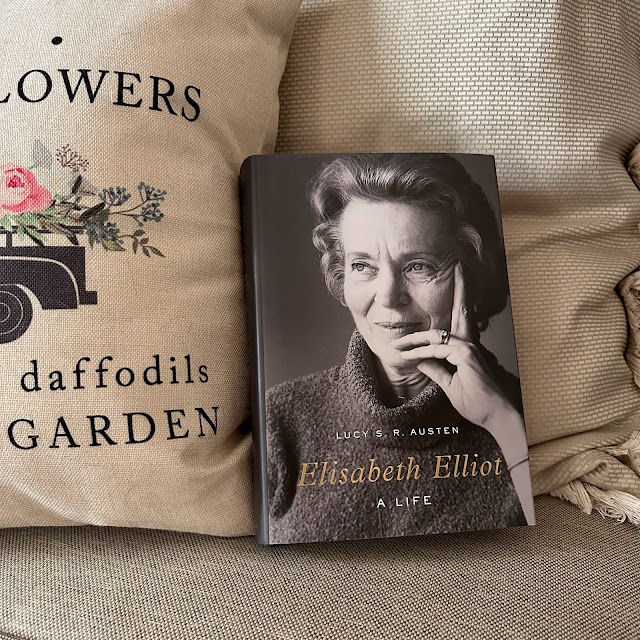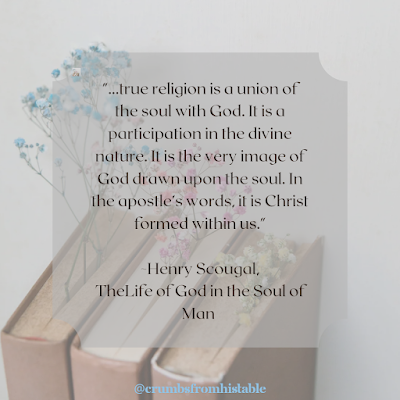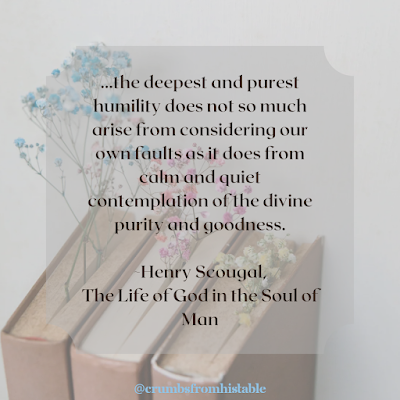In Elisabeth Elliot: A Life, Lucy S. R. Austen has crafted a meticulously researched literary biography of one of the most influential women in twentieth-century Christian history. In describing it as a literary biography, I meant two things: that it paid particular attention to the formation, values, and sustenance of Elisabeth Elliot the writer; and that the biography itself consisted of beautiful and polished literary prose, not unlike what readers might expect from Iain Murray or David McCullough. This style was a pleasure to read and also contributed to the nuanced, complex portrayal of a nuanced, complex woman. Austen’s love, compassion, and respect for her subject shone through, even as she did not gloss over inconsistencies, generational sins, and personal blindspots.
One of my favorite themes Austen brings out from Elisabeth’s life was her writerly bent, beginning in childhood and blossoming at Wheaton College. Long before she wrote professionally, for seemingly all of her life, in fact, Elisabeth metabolized life through words on paper. She poured out and tried to make sense of circumstances and feelings primarily before God and in her journals, far more than she seemed to have done with close family and friends. Even during her young adult years as a missionary in Ecuador, another missionary told his wife “‘how he was impressed that Betty’s gifts tended more toward intellectual pursuits than to personal ministry’ and that he was beginning to pray for a ‘writing ministry’ for Betty” (203). As Providence would have it, that missionary’s death with Elisabeth’s husband Jim, when both men were relative newlyweds, became the catalyst for Elisabeth’s vocation to begin to shift toward writing and, secondarily, speaking at Christian events.
Austen described the genesis of many of Elisabeth’s books, including two I have known of and not yet read and several unknown to me until now. She let Elisabeth tell, in excerpts from letters and books, her own philosophy of biography and her values as a writer. Elisabeth longed deeply to see truly and convey to the reader what she saw. Throughout her life, she pursued a determined quest for truth and commitment to live accordingly, even if that meant contradicting one’s prior experience, writing, or teaching. Like most writers, Elliot fought recurrent battles with imposter syndrome, wondering what audacity gave her the idea that she had anything to say worth reading and whether she would ever find the right words to reach her readers.
In one of my favorite passages, Austen wrote:
Her talks were drawn from the things she had been wrestling with in her own thinking. At the [Wheaton College annual writers’] conference she spoke on “Writing as Personal Discovery,” arguing that we can only write with integrity about what we have learned through experience. The writer’s task is to faithfully portray the things she has seen. This requires a posture of uncertainty and active searching in order to be able to see. It requires openness to change—it will mean that “we don’t think the same way that we thought last year”—and to messiness. The psalmist, she pointed out, says in Psalm 37 not to fret, and then writes other psalms that are “just one long fret.” And it requires a commitment to excellence in the craft of writing: good writing can be trusted “to give form to…truth,” but “bad writing is a lie.”
In contrast to this vision, Elliot said, much of what is called Christian writing begins from the assumption that the writer’s job is to expound the right doctrine, win adherents to the cause, create certainty, prevent change, preserve tidiness. The result, she suggested, is not art but propaganda: “It is the search for truth which gives rise to creativity.” “I believe one of the reasons for the lack of really true Christian art is first of all that we start with the answers. We begin with the cheerful assurance that we know the truth and so the search that is the basis of art is thwarted” (392-393).
To my mind, Austen honored Elisabeth’s aesthetic and biographical values faithfully in this fine volume.
Also through Elliot’s own words, I saw her lifelong struggle with the introversion that made her the observant, thoughtful writer she was but was often not socially acceptable (or even considered sinful) in the evangelical milieu in which Elliot worked. Austen made note of this struggle with gentle compassion and more understanding of various temperaments than perhaps Elliot had. Austen’s own reserved, introspective style suits her subject in this regard.
Along similar lines, Austen chronicled what Elisabeth was reading (as mentioned in journals and letters) at frequent intervals throughout her life. These lists demonstrated shifts and expansions in thinking over the decades and what ideas informed Elliot’s writings. A reader could build a lifetime reading list from the books mentioned in this biography and likely not be able to finish. The breadth of authors and content surprised me, despite my long familiarity with Elisabeth’s work.
This book held other surprises too. I had not realized how greatly her paradigms shifted on matters such as dating and courtship or liturgical worship. The progressive views on certain areas of morality and ethics she articulated in correspondence also raised my eyebrows and seemed likely to delight some readers and dismay others. Her deep and abiding friendship with her younger brother Tom was a bright and happy surprise. On a lighter note, her frequent and emphatic use of italics and underlining in her private correspondence and notes just tickled my funny bone. I could clearly hear her voice in my ear as I read those passages.
The most striking and meaningful insight I received was the depth, diversity, and duration of Elisabeth’s suffering. In no way was her sorrow concentrated in her bereavements of her first two husbands. In fact, it seemed to me that the only periods of her adult life in which happiness prevailed were her marriage to Jim and perhaps her early years back in the United States, when she lived in New Hampshire with her daughter Valerie and another former missionary, her friend Van (Eleanor Vandevort). Many times Elisabeth’s trials brought tears to my eyes. It saddened me that she endured so much for so long.
One of those difficult sections to read described Elisabeth’s growing awareness of what would be diagnosed as Alzheimer’s dementia, an illness I have witnessed in more than one close relative. Elisabeth Elliot had a dazzling intellect, a vibrant love of reading and learning, a sharp wit, and a practically unmatched gift for articulate, thoughtful Christian writing. Many of the lifestyle habits contemporary medicine has advised for Alzheimer’s prevention were consistently part of Elisabeth’s disciplined life. For her to lose the life of the mind must have been like dying while she yet lived. This was heartbreaking to read but only increased my respect and empathy for her.
And yet—the deepest waters and hottest fires she passed through enabled her to speak on and into suffering with authority and compassion. I believed Elisabeth when she addressed the topic of affliction because I knew she spoke from experience. When I have needed help in my own trials and heartbreak, I have wanted someone like Elisabeth (or Joni Tada, Amy Carmichael, Vaneetha Risner…), who endured hard things with grace; airbrushed, glossy celebrity Christianity has offered no cool water to soothe those in the furnace of affliction. Thanks be to God for those who have persevered.
Elliot clearly experienced doubts and changes of convictions over the years, but she never abandoned faith in God and in the Bible. Many earthly things were shaken, but the foundation of her life was the everlasting love of God upon her and the everlasting arms of God beneath her; therefore, her foundation held firm.
This biography provided a long, thoughtful read that amply repaid the investment of time and attention. It was not a book for those who have placed Elisabeth Elliot on an idealized pedestal and committed to keeping her there. The real woman, with all her complexities and contradictions, was much more interesting than the ideal, and seeing her humanity and need to grow and change through this book pointed me back to the Savior she loved and served. Her legacy has always been about His faithfulness, not her own.
The only thing I wished to add to Austen’s biography was an audiobook version. Not everyone could read a book of this length; I thought especially of those suffering profoundly, such as those living with chronic illness and disability that might make reading difficult but Elisabeth’s testimony needful. Perhaps one will come about if reader demand makes it feasible for Crossway to undertake?
Eight years ago, Elisabeth Elliot Leitch Gren took her place in the cloud of those witnesses whose races were finished, and finished in faith. Along with them, her life testified that Jesus was (and is) better than anyone or anything else; that Jesus was (and is) worthy of our full and glad surrender; and that persevering faith was (and is) possible for those who fix their eyes on Him and on the invisible, eternal truth of Scripture.
The embedded link above is an Amazon affiliate link. It will yield me a small commission at no extra cost to you. To purchase directly from the not-for-profit publisher Crossway, visit the website www.crossway.org. The listing for this book is here: https://www.crossway.org/books/elisabeth-elliot-hcj/
Crossway+ members receive 30% off the retail price and a PDF copy with each hardcover purchased.




























